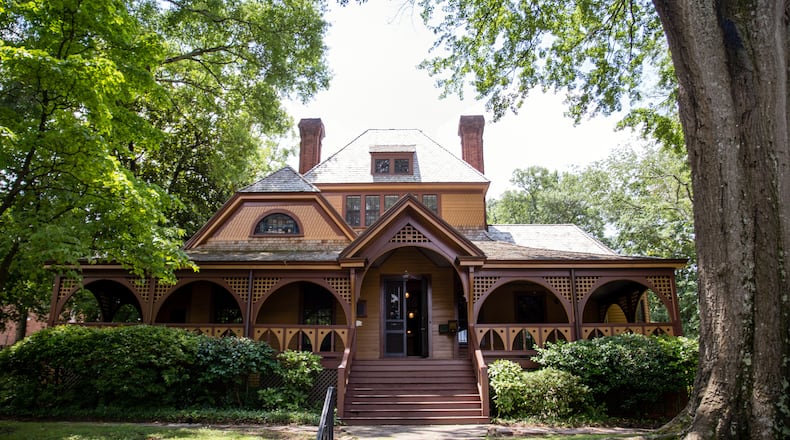Story by Anya Martin. Photos by Jenni Girtman.
When storyteller Akbar Imhotep walked down Gordon Street (now Ralph David Abernathy Boulevard) in the late 1970s, one house, mustard-hued with a green gabled roof and big latticed porch, didn’t seem to belong in the West End neighborhood. “There were big bushes on both sides of the driveway that made it seem forbidden, like you had to have a reason to go there,” he says.
One day in 1985, chaperoning an after-school program took Imhotep inside the Wren’s Nest, once home to Joel Chandler Harris, known for collecting fables featuring perennial trickster Br’er Rabbit. Imhotep heard the house museum was looking for storytellers and left his card. After he got the job, he discovered the timeliness of his arrival. Less than a year before, the Wren’s Nest’s board had removed a “whites only” attendance policy.
“I didn’t think I was making a change,” Imhotep says. “I was just going to tell stories.”
A good story doesn’t always end the way you expect, and the Wren’s Nest has gone through significant changes in the past decades. Today, the museum’s executive directors and artists have sought to reveal a more progressive side to Harris and restore the tales to black storytellers.
“It’s a challenge to put this Atlanta landmark back on the map,” says Melissa Swindell, the museum’s newest executive director who started in August 2017. “Our goal is to make the Wren’s Nest a center for the preservation of African-American folk tales and slave narratives, as well as promoting storytelling on a larger scale. Everybody has a story.”
Her predecessors included Harris’ own great-great-great-grandson Lain Shakespeare, the subject of national news himself when in 2007, at age 23, he launched a capital campaign to renovate parts of the property’s interior, which had remained largely untouched since Harris’ death in 1908. Raising funds to complete that restoration continues to be an ongoing goal, says Swindell, a Decatur native and former research associate at the Smithsonian.
Listed on the National Register of Historic Places, the Wren’s Nest is the oldest house museum in the city, having opened its doors in 1913. Originally a simple farmhouse built in 1870, Harris bought the building and surrounding snap bean farm in 1883 for his wife and children (six of nine survived to adulthood), expanding and adding Queen Anne Victorian-style architectural flourishes. It got its whimsical name when wrens built a nest in the mailbox.
Visitors can think of Harris as the J.K. Rowling of his day, as his “Uncle Remus” books about Br’er Rabbit and company were runaway bestsellers not just nationally but globally, translated into 30 languages. A friend of President Theodore Roosevelt, Harris counted Mark Twain and Rudyard Kipling among his most fervent fans.
Illegitimate, shy and prone to stutter, Harris himself was an unlikely celebrity. He heard the Br’er Rabbit stories from gardener George Terrell and other slaves while working as a teenage printer’s devil, or apprentice, for a plantation newspaper before the Civil War. In the 1870s, he shared them in the Atlanta Constitution as told by fictional Uncle Remus.
Over time and especially after a widely reviled Disney 1946 movie adaptation, “Song of the South,” Harris’ books were charged with cultural appropriation and perpetuating racist stereotypes and plantation romanticism. Recent scholarly re-evaluations, however, suggest that the tales contain a subversive quality that encouraged out-smarting white authority, such as Br’er Rabbit tricking Br’er Fox into throwing him into the briar patch.
Indeed, Harris’ correspondence suggests he was more socially progressive than the “100 white ladies” who segregated the Wren’s Nest museum, Swindell says. In a letter asking steel tycoon Andrew Carnegie to help fund an Uncle Remus magazine, he outlined its purpose as including “the obliteration of prejudice against the blacks.”
The Wren’s Nest’s mission today extends to celebrating contemporary authors and nurturing young writers. The monthly literary series “Beyond Books,” in partnership with Literary Atlanta podcast host Alison Law, features author readings, Q&A and book-signings. The Wren’s Nest Scribes Program pairs writer mentors with eighth graders at Brown Middle School in southwest Atlanta. The students pen personal stories, which are collected into an annual anthology, with this year’s theme being life along the Westside BeltLine.
Imhotep and four other storytellers takes turns performing every Saturday at 1 p.m. and also can be booked for groups. They play all the mischievous animal characters, pairing Br’er Rabbit stories with African folk tales to illustrate deep roots that predate slave ships.
One of Imhotep’s favorite parts of his Wren’s Nest role is telling the stories to tourists from around the world, but the storytelling doesn’t end when he says ‘the end,’ he says.
“The people that I meet tell me stories, sometimes they will bring the books where their great grandmama told stories to their grandmama.”
Akbar Imhotep
Swindell finds Imhotep himself to be something of a storied figure: As a little girl, she heard him tell Br’er Rabbit stories at the public library where her mother worked. “I gasped,” says Swindell upon finding out about Imhotep’s connection to the Wren’s Nest. “To be able to work with an Atlanta celebrity like Akbar is just incredible.”
And it’s just the latest twist in the Wren’s Nest neverending story.
The Wren’s Nest. 1050 Ralph David Abernathy Blvd. 404-753-7735. wrensnest.org
INSIDER TIPS
On guided tours (10 a.m. - 3 p.m.) Saturdays-Sundays, docents tell Harris’ life story and point out unique architectural details, furniture and incidentals. Highlights include Harris’ writing desk from the Atlanta Constitution, gifts from Teddy Roosevelt such as a China cabinet and a taxidermy owl, a Br’er Rabbit and Fox carved wooden humidor, and art nouveau book cases featuring Harris’ works in various editions and languages.
The Wren’s Nest hosts live music at its Jazz Matters series on the third Friday of the month through September, followed by its Living Room Series, second Sundays from October-December and March-May. Its summer “Nestflix” movie screenings take place on the last Saturday of the month through September, including “Black Panther” on Aug. 25.
About the Author
Keep Reading
The Latest
Featured




